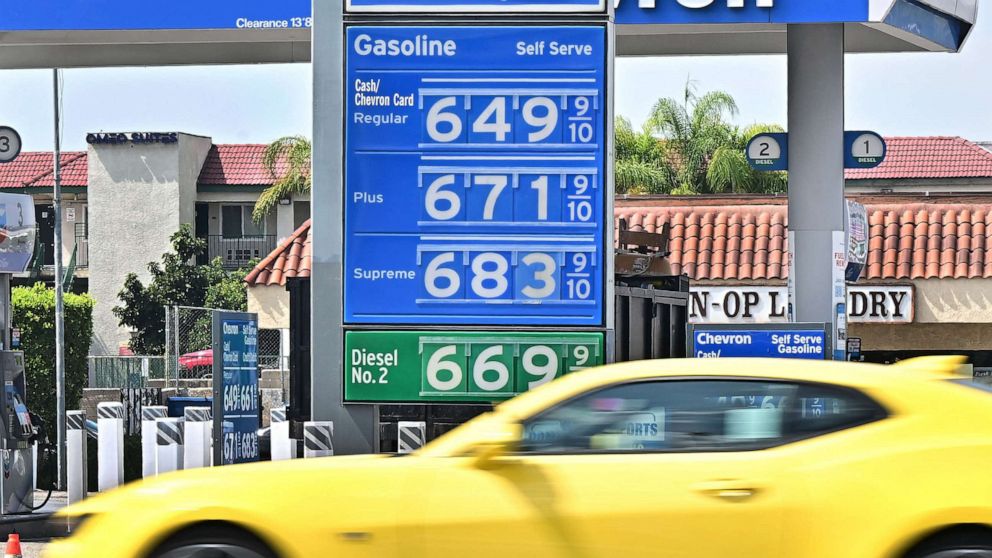California’s gasoline prices are moving higher, even as gas is getting cheaper in the rest of the country. It’s sparking a political fight that’s drawing in oil refiners, the state legislature, and governors of nearby states.
Gasoline prices have been falling fast in most of the U.S. as crude oil prices have come down. The average price of a gallon of gas is down 23 cents in the past month, to $3.21 as of Monday, according to AAA. Some analysts think the average could even go under $3.
But in California, prices have been headed in the other direction. In the past month, prices have actually risen 17 cents, to $4.78 per gallon. In Northern California, things are even worse, with prices averaging more than $5 in many areas.
Gas in California has been more expensive than gas in other states for years, partially because of higher environmental regulations and taxes. But the recent situation is much more dramatic. Now Gov. Gavin Newsom wants to take stronger action that would force oil companies to do more to cool prices. He has called for a special session of the state legislature starting this week to deal with the high gas prices.
The companies say more government interference will likely cause worse outcomes, instead of reducing prices.
There are a few reasons behind the latest spike in prices, experts say. One issue is that multiple California refineries are undergoing maintenance, as they often do after the summer driving season. During maintenance, those refineries go offline temporarily. The problem is there isn’t enough gasoline in storage to cover the shortfall of gasoline from the refineries that are offline, according to the California Energy Commission. Recently, there were 9.9 million barrels of gasoline in storage, down from 11.2 million in late June.
Another factor may be contributing: California is still using a summer blend of gasoline that causes less pollution but can be more costly to make, according to Denton Cinquegrana, chief oil analyst at the Oil Price Information Service, or OPIS. Most of the rest of the country has moved on to a colder-weather blend that’s cheaper to make. California’s stringent environmental rules make it more difficult to procure gasoline from other states when there’s a shortfall.
These problems sound like technical issues, but critics of the oil industry believe that companies operating in the state sometimes take advantage of consumers during times like this to make extra profits. Newsom has blamed oil companies for the premium that California drivers pay and has talked about taking more aggressive action against refiners. Among the refiners in the state are Chevron, Marathon Petroleum, and PBF Energy.
In a letter last week to Newsom and the legislature, the California Energy Commission’s Division of Petroleum Market Oversight said that oil companies are making a windfall, and there aren’t clear market-based reasons to justify it.
“Simply put, there is no reason to believe that the core operational costs of refining crude oil into gasoline in California are higher today than they have been in recent months,” wrote division director Tai Milder. “As a result, price spikes at the pump will once again yield profits spikes for the oil industry.”
Milder says that the state has found evidence in the past of price gouging by oil companies, though the commission didn’t directly use that term in this instance. Oil companies like Chevron have pushed back against the price-gouging accusations by saying that selling gasoline in California is a competitive business, and companies that hike prices above competitors would lose customers.
California Democrats have increased the pressure on the industry in the last couple of years, as the gap between national and state prices has widened. The state passed the California Gas Price Gouging and Transparency Law in 2023 to increase surveillance of the energy market. The law also allows state regulators to take more aggressive action, including potentially capping the margins that refiners in the state make. They’re still determining whether to impose a margin cap.
More recently, Newsom has backed a proposal to allow the commission to make oil refiners keep more gasoline in storage so that prices don’t spike during maintenance periods. The legislature could adopt additional measures.
Opposition is lining up. Refining companies say that California’s taxes and environmental regulations are the biggest reason for the price premium. They say that Newsom’s calls for more regulation will only make the problem worse.
Catherine Reheis-Boyd, president of the Western States Petroleum Association, a trade group representing various kinds of oil companies, said in a statement that Newsom’s proposal showcases “this Administration’s lack of understanding about our industry or fuel markets.”
“Governor Newsom’s refinery supply mandate will create artificial shortages of fuel in California, Arizona and Nevada by forcing refiners to withhold fuels from the market,” she said. “There is no way to simply add fuel storage at refineries.”
Republicans in the state legislature have called for suspensions of environmental regulations and gas taxes to ease the price pressure. The governors of Nevada and Arizona, both of which get much of their gasoline from California refineries, have also pushed back against the proposal. In a letter, Nevada’s Republican Gov. Joe Lombardo, and Arizona’s Democratic Gov. Katie Hobbs asked Newsom to delay any talk of inventory mandates.
“Undoubtedly, we too all share concerns about the high cost of fuel and its impact on communities across our states,” the letter says. “However, we’re concerned that mandating refinery inventory would directly raise the cost of fuel for all of our constituencies and create further economic instability in the region.”






